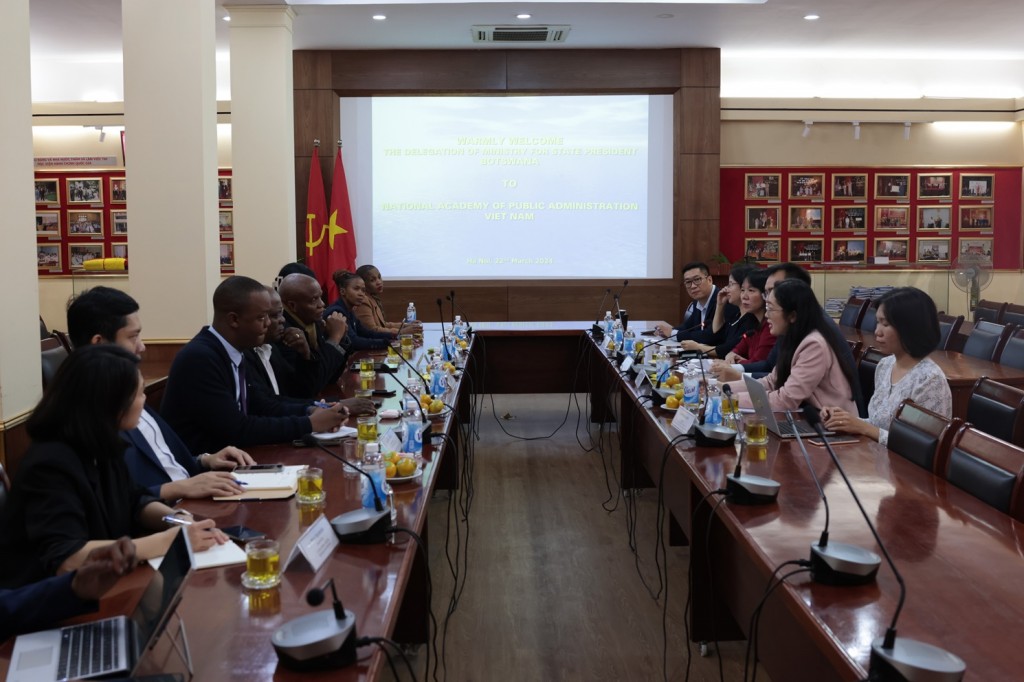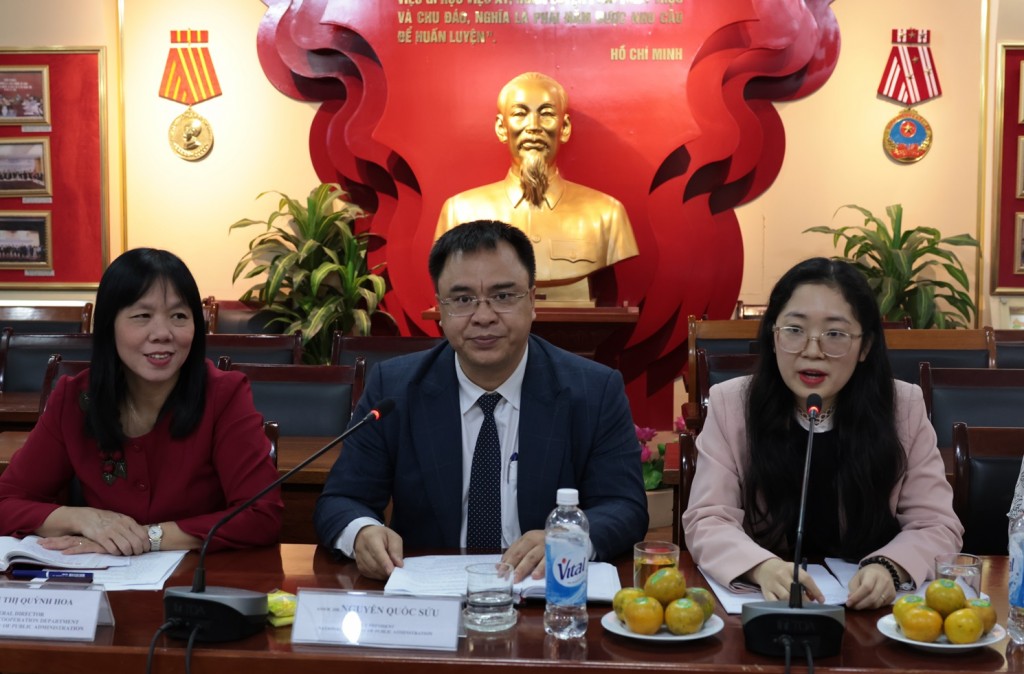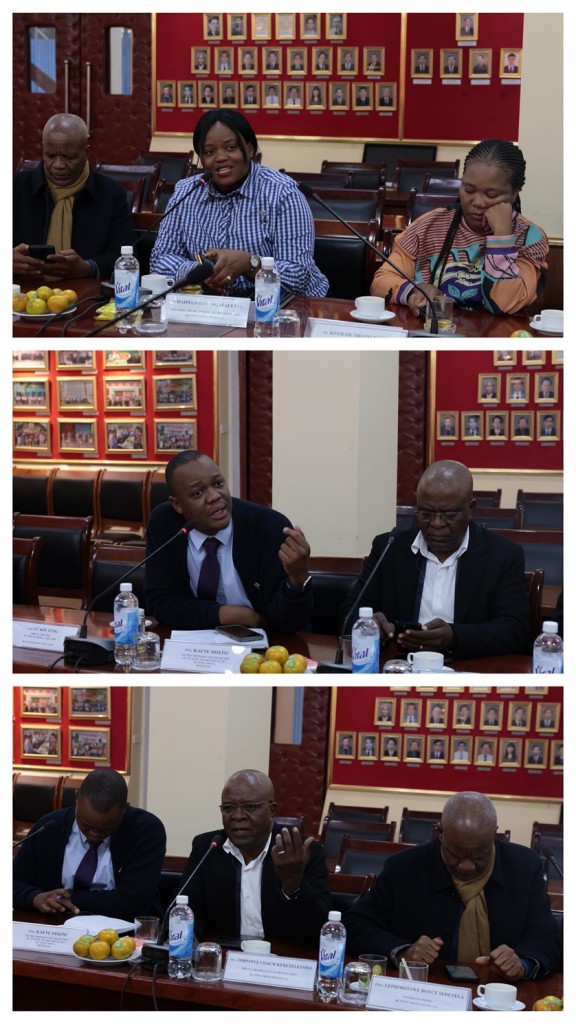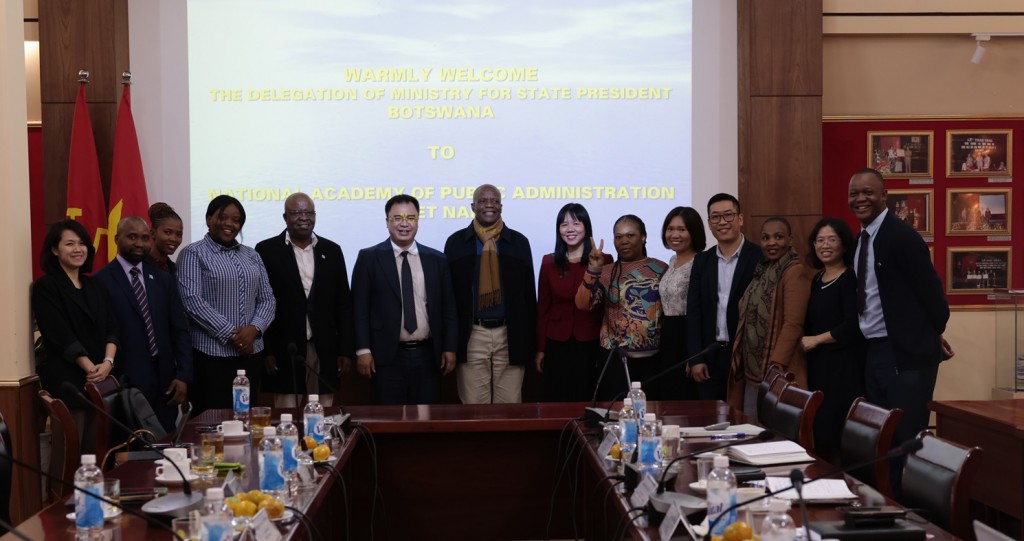On March 22, 2024, at NAPA Headquarters in Ha Noi, the National Academy of Public Administration (NAPA) had a working session with a delegation of high-ranking Botswana officials. The meeting aimed to share experiences on administrative reform, improving the quality of human resources, and innovating thinking for socio-economic development in Viet Nam.
On behalf of NAPA, Assoc. Prof. Dr. Nguyen Quoc Suu, NAPA Vice President, chaired the meeting.
Participating in the working session, the delegation of high-ranking officials from Botswana included Mr. Lephimotswe Boyce Sebetela, Chief of Staff in the Office of the President; Mr. Omponye Coach Kereteletswe, Deputy Director Directorate of Public Service Management, Ministry of the President; Ms. Gorata Rati Tsie, Performance Improvement Coordinator, Ministry of Land and Water Affairs; Ms. Maipelo Bonang Sealetsa, Coordinator, National Mindset Change Campaign, Ministry for State President; Mr. Kaene Disepo, Youth Engagement Lead, National Mindset Change Campaign, Ministry for State President; Ms. Kefiloe Thato Nthite, Communication Lead, National Mindset Change Campaign, Ministry of State President; Ms. Yvonne Kedimotse, Performance Improvement Coordinator, Ministry of Local Government and Rural Development.
From the side of NAPA, there were Ms. Pham Thi Quynh Hoa, Director, Department of International Cooperation; Dr. Bui Thi Ngoc Hien, Vice Dean, Faculty of Administrative Studies; Ms. Le Thi Tuyet, Head, Division of Planning and General Affairs, Department of International Cooperation; Dr. Hoang Vinh Giang, lecturer, Faculty of Administrative Sciences, and officials of the Department of International Cooperation.
At the meeting, Assoc. Prof. Dr. Nguyen Quoc Suu warmly welcomed Mr. Lephimotswe Boyce Sebetela, and members of the high-ranking delegation of Botswana officials to Viet Nam.
Assoc. Prof. Dr. Nguyen Quoc Suu introduced NAPA and its training programs and international cooperation initiatives. NAPA is a special-class public non-business unit, a national center performing the functions of training and upgrading competencies, knowledge and skills in administration, leadership and management for cadres, civil servants, and public employees; human resource training; research on administrative sciences; giving advice and consultancy to the Ministry of Home Affairs on public administration and state management. In terms of vision and strategy, by 2045, NAPA aims to become a regional center for excellence in the Asia-Pacific region for training and research on administration, leadership, and management.
Currently, the Academy provides both undergraduate and postgraduate training programs in various majors, with strengths in public management and public policy. It also organizes short-term training courses for cadres, civil servants and public employees nationwide.
NAPA Vice President expressed his wish for the Botswana delegation to share their research direction and outcomes of their mindset change campaign. He also hoped that in the future, there will be greater alignment and collaboration between the training and research programs of NAPA and those of Botswna, promoting mutual understanding and cooperation opportunities between the two parties.
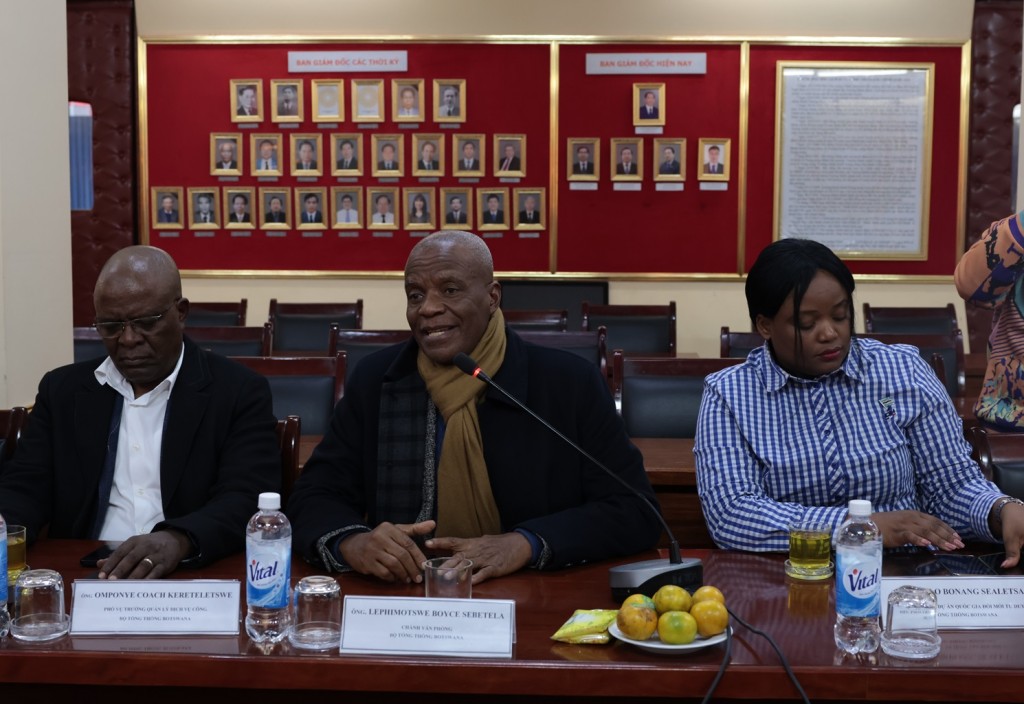
Mr. Lephimotswe Boyce Sebetela, Chief of Staff in the Office of the President, Botswana, speaking at the meeting.
Speaking at the meeting, Mr. Lephimotswe Boyce Sebetela, Chief of Staff in the Office of the President of Botswana, expressed gratitude to NAPA for taking the time to receive the delegation and looked forward to sharing more openly about the future cooperation between Viet Nam and Botswana.
Botswana, located in southern Africa, covers an area of 582,000 km2, with a population of about 2.5 million people. Its GDP reaches 20.35 billion USD, and the per capita income exceeds 7,700 USD (World Bank data for 2022). Thanks to its political stability, strict budget management, and rich mineral resources, especially diamonds, Botswana has developed from one of the poorest countries in the world into a rapidly developing nation, with an upper-middle income per capita. Botswana is launching a national mindset change campaign to implement the National Vision 2036, turning Botswana into a high-income country by 2036.
Viet Nam and Botswana established diplomatic relations on February 11, 2009. Botswana desires to learn from Viet Nam’s recent achievements in socio-economic development and administrative reform.
Mr. Lephimotswe Boyce Sebetela also requested NAPA to share experiences with Botswana on administrative reform, improving the quality of human resources, and innovating thinking for socio-economic development in Viet Nam.
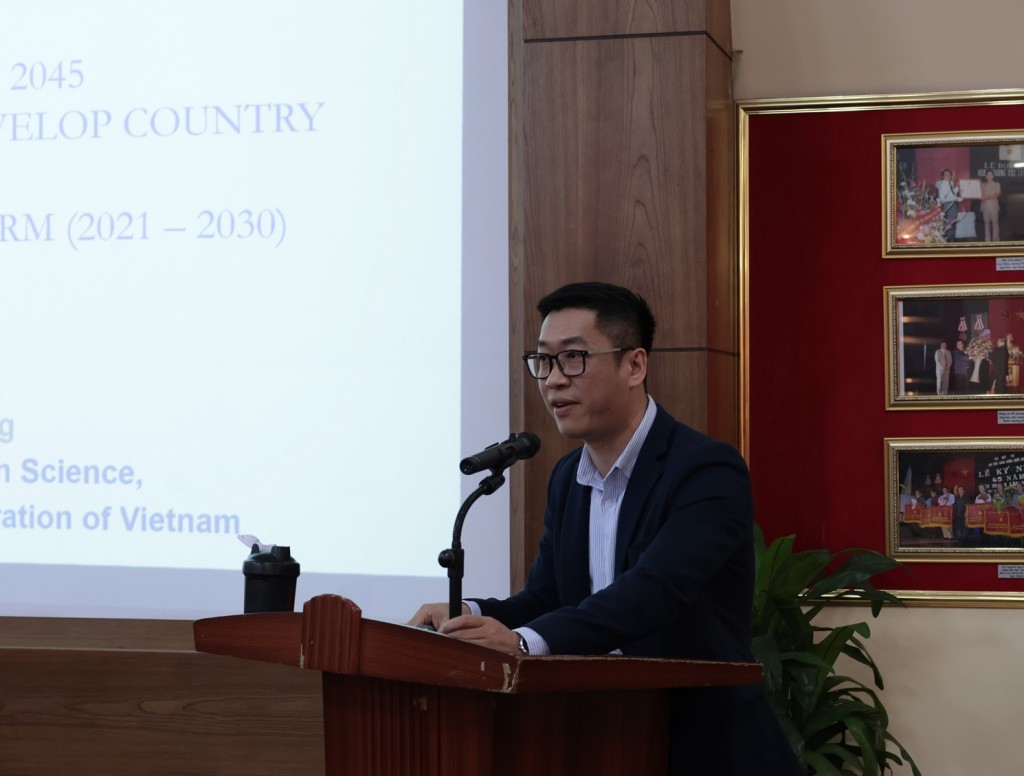
Dr. Hoang Vinh Giang, lecturer of the Faculty of Administrative Sciences, NAPA, sharing at the meeting.
At the meeting, Dr. Hoang Vinh Giang, lecturer at the Faculty of Administrative Sciences, shared the presentation “National Vision of 2045 – Innovative thinking to develop the country and public administration reform (2021 – 2030). He emphasized seven global megatrends, namely VUCA, globalization, urbanization, population ageing, sustainable development, social responsibility and the 4th industrial revolution. He affirmed: “Resources originate from thinking, motivation originates from innovation” (quoted from Prime Minister Pham Minh Chinh).
Viet Nam is currently facing a breakthrough choice to transform the country into a strong, prosperous country, on par with the great powers of five continents, or to fall behind and fall into the middle-income trap. By 2045, Viet Nam is going to become a developed modern country (Resolution of the Party Central Committee No. 23-NQ/TW, Hanoi, March 22, 2018); “Towards the vision of 2045, when the country celebrates the 100th anniversary of the independence, Viet Nam aims to become a happy, prosperous, and thriving nation and ascend to the league of high-income countries” (Former Prime Minister Nguyen Xuan Phuc, speaking at the meeting with the Ministry of Planning and Investment (2019)).
Key innovations in Viet Nam’s economic development include innovating thinking about developing a socialist-oriented market economy, innovating thinking about international integration for economic development, innovating thinking about the leading role of the state economy in accordance with the Party’s development rules and political orientation, innovating thinking on economic development to overcome the “middle-income trap”, innovating thinking in rapid and sustainable economic development, and innovating thinking to “leapfrog” digital economic development in the context of the 4.0 industrial revolution.
At the working session, members of the Botswana delegation shared their opinions to further clarify experiences in administrative reform, enhancing the quality of human resources, and innovating thinking to develop the economy and society in Viet Nam. He also suggested potential areas of cooperation between NAPA and Botswana in the future.


